Das Europäische Parlament hat heute mit großer Mehrheit (381 Stimmen) die vorläufige Trilog-Vereinbarung zur Überarbeitung…
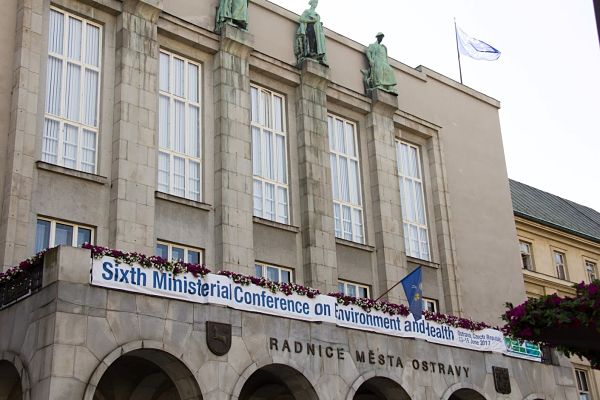
To increase citizens’ engagement and speed up action on key areas of environmental health, the Health and Environment Alliance (HEAL) travelled to Ostrava in the Czech Republic to participate in the Sixth Ministerial Conference on Environment and Health organised by the World Health Organization (WHO), which took place from 13-15 June.
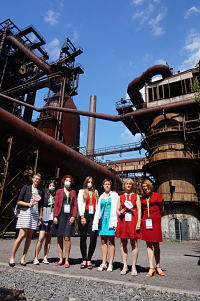
The HEAL delegation included young people and a well-rounded mix of health, patient and environmental voices organisations: AIM (Association Internationale de la Mutualite), EFA (European Federation of Allergy & Airways Diseases Patients’ Association), Inter-Environnement Wallonie (IEW) and Hygiène Publique in Hainaut.
The Sixth Ministerial Conference is part of the WHO European Environment and Health Process (EHP) that is working towards implementing selected and relevant environment and health goals and targets of the 2030 Sustainable Development Agenda in the European Region as well as the Health 2020 – the WHO European policy framework for health and well-being.
Defining Europe’s environment and health priorities in the 21st century
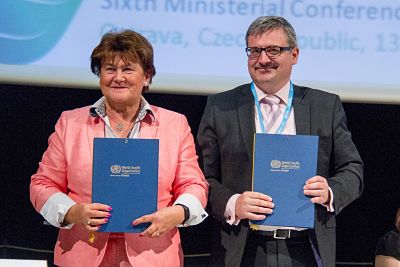
Almost one and a half million deaths per year in the WHO European Region are caused by environmental risks that could be avoided and/or eliminated. There is therefore urgent need to continue and strengthen efforts addressing the leading environmental determinants of ill health. These include:
• air pollution;
• inadequate water and sanitation services;
• hazardous chemicals;
• waste and contaminated sites; and
• climate change
Member States adopted a Declaration of the Sixth Ministerial Conference on Environment and Health which includes an action plan for its implementation and agreement on revised institutional arrangements for the European Environment and Health Process after 2017. Although the actions are not legally binding for the Member States, the political importance of the declaration and pledges to produce national environmental health portfolios by end of 2018 should increase the urgent action needed.
HEAL’s involvement
HEAL has been heavily involved in the run up to the conference, being a dedicated member of the European Environment and Health Task Force (EHTF) which is the international body for the implementation and monitoring of the WHO European Environment and Health Process. This task force has been meeting regularly in the period leading up to the conference and in fact served as steering body for its preparation.
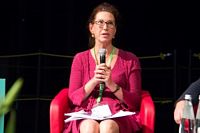
Génon K. Jensen, Executive Director of HEAL was invited to speak at the panel session on ‘Maximizing the benefits for people of international and national environment and health policies’. She shared two examples of how HEAL with its member organisations, partners and strong global, national, local grass roots connections, grounded in scientific networks and partners, has contributed to building up this two way channel and increase participation in environmental policy making.
Ms. Jensen highlighted HEAL’s collaboration work with citizens and civil society through the EDC-Free Europe coalition with over 70 campaign partners across Europe and HEAL’s landmark report the Unpaid Health Bill – How coal power plants are making us sick. This enables HEAL to share: increasing evidence on health impacts related to EDCs and coal power generation, the growing mobilisation from the health community and opportunities for prevention and public health gain through public participation. For transitioning out of coal, this has contributed to a commitment to phase out coal in the UK by 2025 and halting the construction of 3 new coal power plants in Poland for example.
She encouraged national governments to increase protection for vulnerable groups, particularly current and future children by extending their stakeholder engagement to national chapters of the International Federation of Gynecology and Obstetrics (FIGO). The FIGO statement on addressing the risks to babies and mothers associated with everyday exposure to toxic chemicals recommends that health professions advocate for policies to reduce exposure and champion environmental health justice.
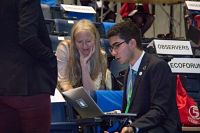 HEAL organised and co-organised several side events and HEAL representatives intervened, presented and discussed in a number of session throughout the event.
HEAL organised and co-organised several side events and HEAL representatives intervened, presented and discussed in a number of session throughout the event.
HEAL also launched publications and briefings like the ‘Healthy Energy Paper’ (which analyses all forms of power generation and their pros and cons when it comes to human health, both short and long term) and the ‘Quick Guide on how to calculate the health impacts and costs from coal’ that explains visually that and how health impacts and economic costs of air pollutant emissions from coal power plants can be calculated and quantified.
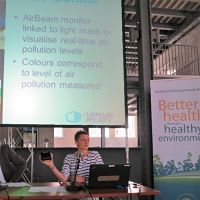 HEAL organised an official side event and monitored air quality when travelling to Ostrava, as well as at the event, and released a press release entitled ‘How does your real-time air quality rate?’ stressing the fact that air pollution well above the WHO limits can be found in many areas in Europe, with around 90% of EU citizens living in cities being exposed to levels considered harmful to health and showing how citizens can get involved in advocating for better air, for example through the Unmask My City campaign.
HEAL organised an official side event and monitored air quality when travelling to Ostrava, as well as at the event, and released a press release entitled ‘How does your real-time air quality rate?’ stressing the fact that air pollution well above the WHO limits can be found in many areas in Europe, with around 90% of EU citizens living in cities being exposed to levels considered harmful to health and showing how citizens can get involved in advocating for better air, for example through the Unmask My City campaign.
Find out more about HEAL and our work at the WHO Ministerial Conference:
• Check out the WHO official event website and photos
• Watch special interviews with our delegation members Isabel Proano (EFA) and Jessica Carreno (AIM)
• Read HEAL’s interventions and speeches during the WHO ministerial conference plenary sessions
• Did you miss us on social media? Read back our online coverage of the event on Twitter below, or visit our Twitter and Facebook pages!



